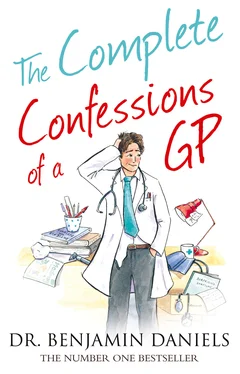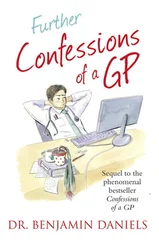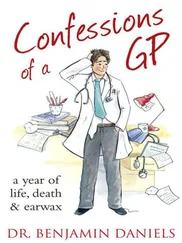Benjamin Daniels - The Complete Confessions of a GP
Здесь есть возможность читать онлайн «Benjamin Daniels - The Complete Confessions of a GP» — ознакомительный отрывок электронной книги совершенно бесплатно, а после прочтения отрывка купить полную версию. В некоторых случаях можно слушать аудио, скачать через торрент в формате fb2 и присутствует краткое содержание. Жанр: unrecognised, на английском языке. Описание произведения, (предисловие) а так же отзывы посетителей доступны на портале библиотеки ЛибКат.
- Название:The Complete Confessions of a GP
- Автор:
- Жанр:
- Год:неизвестен
- ISBN:нет данных
- Рейтинг книги:3 / 5. Голосов: 1
-
Избранное:Добавить в избранное
- Отзывы:
-
Ваша оценка:
- 60
- 1
- 2
- 3
- 4
- 5
The Complete Confessions of a GP: краткое содержание, описание и аннотация
Предлагаем к чтению аннотацию, описание, краткое содержание или предисловие (зависит от того, что написал сам автор книги «The Complete Confessions of a GP»). Если вы не нашли необходимую информацию о книге — напишите в комментариях, мы постараемся отыскать её.
The Complete Confessions of a GP — читать онлайн ознакомительный отрывок
Ниже представлен текст книги, разбитый по страницам. Система сохранения места последней прочитанной страницы, позволяет с удобством читать онлайн бесплатно книгу «The Complete Confessions of a GP», без необходимости каждый раз заново искать на чём Вы остановились. Поставьте закладку, и сможете в любой момент перейти на страницу, на которой закончили чтение.
Интервал:
Закладка:
‘Jackie, why do you think you’re having all this pain?’
‘I dunno. You’re the doctor.’
‘It looks like you have had quite a hard time over the years.’
‘You can say that again.’
‘Some people find that going through large amounts of stress and upset can contribute to having physical pains and low energy.’
‘You think I’m making it up, don’t you? This pain is real, you know.’
‘I don’t think you’re making it up, Jackie. The pain is real but I just think that perhaps all the stress you’ve been through might be a big component to your symptoms.’
‘Nobody believes me. You doctors are all the same. You can’t leave me like this. I need something for the pain. I’m only 39 and I’ve not been out of the house for weeks. That can’t be normal, can it? You have to help me. I need something for the pain!’
‘I’m sorry, Jackie, but research has shown that fibromyalgia doesn’t really respond to painkillers. Some people find that gradually increasing activity levels and exercise can help. I could also refer you for some specialist talking treatment called cognitive behavioural therapy. There have been some studies to suggest that this can be useful.’
‘So you’re basically doing nothing for me.’
‘I’m not sure what more I can do, Jackie. I’m sorry.’
Doctors tend to deal with patients like Jackie badly. By simply organising more tests and giving more drugs we are positively reinforcing the idea of the sufferer having a medical illness that is the responsibility of the medical profession to treat. The years of hospital out-patient appointments and specialist referrals encourages the idea that the person is sick. It is a role that they subconsciously fill and become dependent on. Being labeled as ‘ill’ is a distraction from the fairly miserable social and emotional problems that are the underlying problem. In some cases being ‘ill’ is also a way of exerting some control on the people around them.
My best efforts at trying to gently persuade Jackie to start thinking about the connection between her physical and emotional health were clearly spectacularly unsuccessful and the next time she requested a home visit she specifically asked to see any doctor other than me. I know that this means I have failed, but I have to admit that it is a real relief to know that I won’t have to stand awkwardly in her lounge feeling helpless as I watch her suffer. One of my colleagues visits her instead and starts her on morphine.
Mrs Briggs
It is 3 a.m. on a Sunday night and I’m working on call for the ‘out-of-hours’ doctors. I get a call through to do an emergency visit. Before I arrive, I have only minimal information about what to expect. All I know is that I’m visiting Mrs Briggs who is in her seventies and has breast cancer.
When I arrive, five or six family members greet me at the door. I’m ushered upstairs in hushed silence and shown into a dimly lit bedroom. In front of me lies a skeleton of a woman. Pale and semi-conscious, she is quite clearly dying. In my years as a doctor I’ve seen many people die. In hospital it is all quite clinical. It is easier to think of them as the ‘stroke’ in bed 3 or the ‘lung cancer’ in cubicle 2, rather than as a real person. In the patient’s own home it is less easy to protect yourself from the enormity of somebody’s death. Surrounded by belongings and pictures of them looking healthy and contented during happier times, the dying person feels overwhelmingly real.
The daughter explains to me that her mum’s wish is to die at home and the family is determined to keep her out of hospital or hospice. Up until now she had been managing fairly well, drinking small amounts and her pain was well controlled with tablets. Unfortunately, over the course of the evening she had deteriorated quite rapidly and she was now agitated and seemed to be in pain. She was writhing around the bed and crying out. With end stage cancer, it is very unpredictable as to how and when someone will actually die. With heart attacks, it is easy to understand. The heart ceases being supplied with blood and oxygen so it stops and that’s it. A slow-growing tumour that spreads and eats you away from the inside makes you weak and frail but it is difficult to know exactly how and when it will finally kill you. I couldn’t be sure exactly what it was that was going to end Mrs Briggs’s life, but there was no doubt in my mind that she was going to die tonight.
One of the principal aims of palliative care is to keep the patient pain free until the end. Mrs Briggs was only semi-conscious and couldn’t answer my questions. I couldn’t be sure of exactly how aware she herself was of the pain, but she was certainly agitated and appeared distressed and I couldn’t leave her like this. It was also very upsetting for her family and they were desperate for me to do something. Mrs Briggs couldn’t take anything orally so I was going to need to give her an injection of something and that something was morphine. Since Harold Shipman, GPs have been extremely nervous about using morphine in this way. Dr Shipman used injections of morphine to kill his patients and so, understandably, my decision to inject a syringe of the stuff into Mrs Briggs wasn’t one to be taken lightly, especially as I knew that she could potentially die quite quickly as a result.
In an ideal world I would set up a syringe driver, which is a pump that slowly injects morphine automatically into the patient until the pain is controlled. But it was 3 a.m. and Mrs Briggs needed pain relief now. There was no way that I was going to be able to organise a syringe driver tonight. I took the family aside and explained that I wanted to give her an injection of morphine. I explained that it might decrease her level of consciousness but would ease the pain and agitation. The family was well aware that she only had a few hours left and they wanted them to be peaceful and pain free. They were happy for me to give the injection. I drew up the morphine into my syringe and slowly injected the clear fluid under her skin. In front of my eyes, her tense agitated body relaxed. I only gave her a few mils, but she had so little flesh on her that she didn’t need much for it to take effect. As Mrs Briggs’s writhing body calmed, so did the torment on the faces of her family. Her breathing became shallow and she slipped into a deep coma and died a few hours later.
Her family was immensely grateful. It wasn’t euthanasia, but perhaps my injection of morphine sped up her death by a few hours. Many of my day-to-day actions as a GP lead me to question the ethics of the choices I make. However, I never doubted that my decision to give Mrs Briggs morphine that night was the right thing to do. My fears about giving morphine are more about the family and how they might react. If I had thought that the family wasn’t on my side, I wouldn’t have given the morphine. Not because the wishes of the family are more important than the wellbeing of the patient, but because I wouldn’t want to have to defend my actions in court. Mrs Briggs would have suffered but I’m not prepared to be labelled as the ‘next Shipman’. People accuse doctors of playing God by choosing when patients live or die and sometimes we do, but as long as our decisions are made with compassion and not arrogance, I’ll make no apologies.
Betty Bale’s cat
Betty Bale is the only patient that I can remember from my first six-month stint as a doctor. She was admitted to my ward on my first day and was still in that same bed when I finished six months later. She was only in her late sixties but had suffered a severe stroke, which meant that she was pretty much completely paralysed. She could speak but it was slurred and she dribbled. It was always an effort to make out her words and even more of an effort for her to say them. She couldn’t swallow so had to be fed through a tube running straight into her stomach. All in all, it was a fairly miserable existence.
Читать дальшеИнтервал:
Закладка:
Похожие книги на «The Complete Confessions of a GP»
Представляем Вашему вниманию похожие книги на «The Complete Confessions of a GP» списком для выбора. Мы отобрали схожую по названию и смыслу литературу в надежде предоставить читателям больше вариантов отыскать новые, интересные, ещё непрочитанные произведения.
Обсуждение, отзывы о книге «The Complete Confessions of a GP» и просто собственные мнения читателей. Оставьте ваши комментарии, напишите, что Вы думаете о произведении, его смысле или главных героях. Укажите что конкретно понравилось, а что нет, и почему Вы так считаете.












